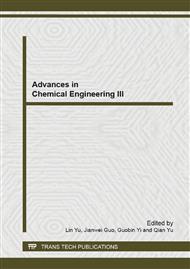p.1495
p.1500
p.1508
p.1513
p.1519
p.1523
p.1528
p.1534
p.1540
Effect of Different Temperatures on the Quality of Dendrobium Officinale Storage
Abstract:
In this research, Dendrobium officinale was studied at different storage temperatures for water loss, soluble solids, titratable acids, membrane permeability, malonaldehyde (MDA) changes. Results showed that weight loss rate was positively associated with storage temperature, the higher of storage temperature, the weight loss more severe and the quality of dendrobium stem was lower. Dendrobium’s titratable acid content, soluble solids content changed slowly than 10°C, 20°Cwhen it was stored in 0°C temperature but their content were higher than 10°C, 20°C samples . Storage temperature is positively correlated with the change of membrane permeability and malonaldehyde (MDA) as the extension of storage time, high temperature will damage the membrane permeability of Dendrobium and at the same time the production of membrane lipid peroxidation caused.
Info:
Periodical:
Pages:
1519-1522
Citation:
Online since:
September 2013
Authors:
Price:
Сopyright:
© 2013 Trans Tech Publications Ltd. All Rights Reserved
Share:
Citation:


